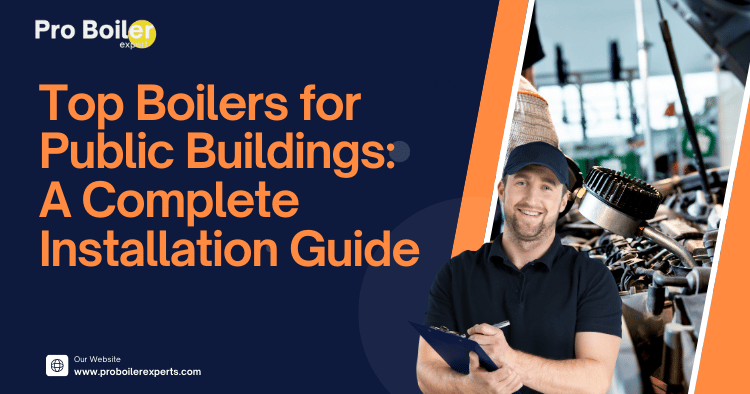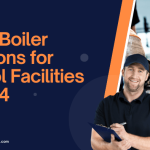Table of Contents
- Introduction
- Understanding the Importance of Boilers in Public Buildings
- Types of Boilers Suitable for Public Buildings
- Boiler Sizing: How to Choose the Right Size
- Energy Efficiency Ratings Explained
- Installation Process: What to Expect
- Maintenance Tips for Longevity
- FAQs
- Conclusion
Introduction
When it comes to public buildings—be it schools, hospitals, or community centers—efficient heating systems are essential. Boilers play a critical role in ensuring that these large spaces remain warm and comfortable for occupants. In this guide, we’ll explore the best boiler options available for public buildings and provide you with an installation roadmap to ensure you make the right choice.
“A well-functioning boiler is not just about comfort; it’s about creating a safe environment for everyone in a public space.”
Understanding the Importance of Boilers in Public Buildings
Boilers serve as the backbone of heating systems in public buildings. They are responsible for generating hot water and steam, which is then distributed throughout the facility. Here are a few key reasons why boilers are indispensable:
- Comfort: Ensures a comfortable environment for staff, students, and visitors.
- Efficiency: Modern boilers can significantly reduce energy costs and carbon footprints, especially with advancements in technology leading to higher energy efficiency ratings.
- Reliability: A well-maintained boiler system ensures consistent heating even during the coldest months.
“Investing in efficient boiler systems is investing in the future of public infrastructure.”
Types of Boilers Suitable for Public Buildings
When selecting a boiler for a public building, it’s essential to consider the specific needs and layout of the facility. Here are three primary types of boilers you might encounter:
3.1 Combi Boilers
Combi boilers are compact units that provide both heating and hot water on demand. They’re ideal for smaller public buildings where space is a premium.
Pros:
- Space-saving design
- No need for a separate hot water tank
- Energy efficient
Cons:
- Limited hot water supply during peak times
“Combi boilers are perfect for facilities that prioritize space and efficiency.”
For more insights on the benefits of combi boilers, check out Top 5 Benefits of Choosing Combi Boilers for Your Home.
3.2 System Boilers
System boilers are designed for larger public buildings. They require a hot water cylinder but have a built-in pump, making installation more straightforward.
Pros:
- Suitable for larger heating demands
- Can supply multiple outlets simultaneously
Cons:
- Requires more space due to the hot water cylinder
“System boilers strike a balance between efficiency and capability, making them a popular choice for larger facilities.”
Learn more about system boilers in Top 5 Benefits of Choosing a System Boiler for Your Home.
3.3 Regular Boilers
Regular (or traditional) boilers are typically used in older buildings. They consist of a boiler, a hot water cylinder, and a cold water tank.
Pros:
- Can provide high volumes of hot water
- Ideal for larger buildings
Cons:
- Takes up more space
- Less energy-efficient than modern alternatives
“Regular boilers may seem outdated, but they can still offer reliable performance in the right settings.”
For additional information on traditional boiler systems, explore Top 5 Benefits of Conventional Boilers for Your Home.
Boiler Sizing: How to Choose the Right Size
Choosing the right size boiler for your public building is crucial for energy efficiency and comfort. A boiler that’s too small won’t adequately heat the space, while an oversized unit can lead to unnecessary energy consumption.
Sizing Guidelines:
- Calculate Heat Loss: Use a heat loss calculator to determine how much heat is lost through walls, windows, and doors.
- Consider Usage Patterns: Factor in peak usage times when planning for hot water needs.
- Local Regulations: Consult local building codes and regulations for specific requirements.
| Building Type | Required BTUs (British Thermal Units) |
|---|---|
| Small Office | 30,000 – 60,000 |
| Medium School | 60,000 – 120,000 |
| Large Hospital | 120,000+ |
“Proper sizing can make or break the efficiency of your boiler system.”
Energy Efficiency Ratings Explained
Energy efficiency is a critical consideration when selecting a boiler. Look for the following ratings:
- Seasonal Efficiency (SEDBUK): Measures the energy efficiency of the boiler over a year.
- Energy Star Rating: Indicates that the boiler meets energy efficiency guidelines set by the U.S. Environmental Protection Agency.
Choosing a boiler with higher efficiency ratings can lead to significant savings on energy bills. For further reading on energy efficiency standards, check out Top 5 Energy Efficiency Ratings for Your Boiler.
“Higher efficiency means lower bills—it’s a win-win for public buildings.”
Installation Process: What to Expect
Installing a boiler in a public building typically involves several key steps:
- Planning: Assess the heating needs and choose the appropriate boiler type and size.
- Preparation: Clear the installation area and ensure compliance with local codes.
- Installation: A qualified technician will install the boiler, ensuring all connections are secure.
- Testing: The system will undergo testing to ensure it operates efficiently and safely.
Important Note: Always hire a licensed professional for installation to ensure safety and compliance with regulations. For tips on installation, refer to Installation Day: What to Expect for Your New Boiler.
“A professional installation can save you from future headaches and ensure optimal performance.”
Maintenance Tips for Longevity
Regular maintenance is essential for the longevity and efficiency of your boiler. Here are some tips to keep your system in top shape:
- Annual Inspections: Schedule yearly check-ups with a qualified technician.
- Bleed Radiators: Release trapped air in radiators to improve efficiency. See Top 5 Steps to Effectively Bleed Your Radiators.
- Monitor Pressure Levels: Ensure the pressure readings are within the recommended range.
For more detailed maintenance schedules, refer to Essential Boiler Maintenance Tips: Keep Your System Efficient.
“Consistent maintenance is the key to a long-lasting and efficient boiler.”
FAQs
Q: How long do boilers typically last?
A: With proper maintenance, boilers can last anywhere from 10 to 25 years.
Q: What are the signs that my boiler needs repair?
A: Look for unusual noises, leaks, or inconsistent heating.
Q: Can I install a boiler myself?
A: It’s highly recommended to hire a professional for installation to ensure safety and compliance with local regulations.
“When in doubt, always consult a professional—it’s better to be safe than sorry.”
Conclusion
Choosing the right boiler for a public building is a significant decision that can impact comfort, efficiency, and operational costs. By understanding the different types of boilers, sizing requirements, and maintenance needs, you can select a system that meets your building’s needs effectively. Remember, always consult with professionals for installation and maintenance to ensure the best outcomes for your facility.
For more information and resources on heating systems, feel free to explore the links provided throughout this guide. Happy heating!





